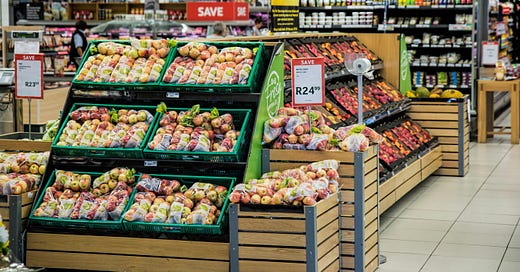The grocery store is the greatest creation of the modern world. I think we easily take for granted how life altering the grocery store is. A peer reviewed study conducted in my apartment bedroom— among me and my cat— found it ranked ahead of shoelaces, the international space station, vaccines, the tiny pull tab on pop cans, Wikipedia, and escalators in terms of greatest human inventions and the greatest proof that God died several years ago due to unforeseen circumstances.
When I walk into a store, I can generally find almost anything my mind can physically imagine. I can find hundreds of different cheeses from goat to cow. I can find fruits and vegetables from Africa, Europe, South America, North America, Asia, and mayhap even Australia. Regardless of season, temperature, or day of the week, I can go to a store and get a dragon fruit, banana, strawberry, tomato, or even a mango. While purchasing these rare food items I can swing over to the pharmaceutical section and buy any number of veritable magical potions that could heal just about any ailment you can imagine— barring cancer (or maybe even that if you choose to believe the homeopathic items there) and even further beyond that I can go to the hardware section and find enough tools that our Paleolithic ancestors would weep at the mere thought of such advancements.
The craziest thing about all this though? The really crazy thing? This is all mundane to us.
How often have you thought about these things? You have access to more exotic, luxurious, practical, and technologically advanced items than any human ever in history—likely all within 3.8 miles of you.1 Isn’t that neat? The sum of all human effort has effectively led to this creation. Almost any useful —or even non-useful— item can be found in your local grocery store. I can go to my local store and buy salmon from Chile, apples from Tajikistan, and a roll of 35mm camera film from Japan all without breaking a sweat here in middle america.
We can go deeper. Not only can you find all these items, but think about the scale of this operation. All those exotic fruits and vegetables, whether in season or not, were either grown in their native countries, meticulously frozen, unfrozen, and shipped all the way to your local grocery store—or they were grown in advanced greenhouses designed to mass-produce exotic foods semi-locally. Think of all the people required to conduct this massive operation.
Consider the mighty pencil: a lumberjack chops down the tree that will become the wood, a miner digs up the graphite for the lead, and another miner extracts the aluminum for the eraser bit. A metallurgist smelts and processes that aluminum, rubber is farmed and manufactured into an eraser, and a factory assembles all the parts. And that’s not even touching the logistics, packaging, designing, and bureaucratic work needed to make it all happen. Hundreds, if not thousands, of people contribute to making just one pencil… and you can buy a pack of 18 for three dollars at my local Meijer.
Listen to this old balding guy with glasses explain it to confirm what I said because he fulfills your likely preconceived notions of what an intelligent person ought to look like (spoiler he is):
Now, let’s scale that up. Apply this same thought process to every item in a grocery store. It’s a monumental feat of human ingenuity, genius, and cooperative effort. Every grocery store across America, Europe, Africa, and possibly even Australia relies on a logistical system capable of bringing these diverse and worldly bounties across continents daily, right to your front door. It’s an ecosystem that requires the work of billions of humans.
Every item you pick up, glance at, and barely even register in a grocery store is part of a billion-person effort to get that object within your reach. That item has likely traveled hundreds or even thousands of miles to get where it is. It has crossed mountains, traversed deserts, flown in the air, and sailed across the sea. Hundreds of thousands of humans have interacted with it—knowingly or unknowingly—just for you to go, “Eh, not for me,” and walk on, never thinking about it again.
You can think of all this as a testament to the power and greatness of the free market and capitalism. Or as a global scheme of worker exploitation by the free market. Or as a cautionary tale about food deserts and modern poverty. Or as the mystical power of God. Or as the voodoo magic of your neighborhood drug dealer.
You can even believe I did it, if you really want to. I’d appreciate that. You’re very welcome, actually—it’s hard work, you know.
But at the end of the day, it exists. For better or worse, it exists. And it is awesome in its size, scale, and majesty. Nothing like it has ever existed in this world before, and I think it has forever changed the human species. It has changed us more than the moon landing, the deep fryer, the picture frame, the UN Human Rights Council, or even the humble Coca-Cola can ever has—or ever will.
So for just one moment…
Stop.
And think about just how neat it is that we get to experience a grocery store.
It's cool isn’t it?
Bet your great-great-great-great grandpappy is jealous.
Alright, that’s enough thinking. You can stop if you want.
...Alright, it is pretty cool, isn’t it? Maybe just one moment more.
In summary: next time you’re in a grocery store, appreciate it a little more. A lot of people worked hard for us to get here. Enjoy the fact that you can see the world just a few miles from your house, whenever you want, defying the laws of nature on the regular. It’s pretty neat, after all. It’s like giving the middle finger to God but no one gets sad about it.
This article is basically just a worse version of Joe Pera’s Walking Around the Grocery Store episode, so honestly, just go watch that instead to get some actual meaning out of any of this.
Here’s a short clip from that episode:
https://www.upside.com/blog/how-far-will-grocery-customers-travel#:~:text=Keep%20in%20mind%20that%20the,than%20the%20typical%20American%20household.






